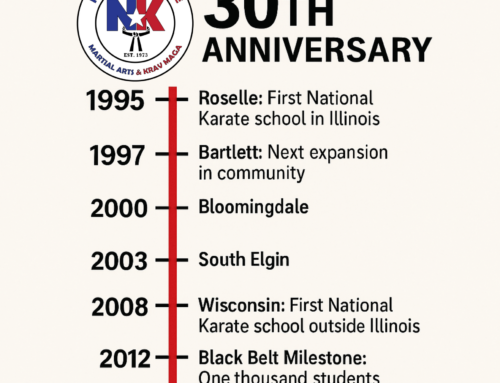
Self-Discipline
Your child’s future isn’t a distant mystical event. It’s happening right now. Helping them develop self-discipline as early as possible will affect them on a neuronal level. Self-discipline is controlling or overriding your feelings and thoughts, overcoming weaknesses, and pursuing what is right despite any internal or external temptations to abandon rightness. It is also synonymous with self-control and self-mastery, tied to emotion regulation. Karate for kids isn’t just about fun but connects with semantic memory.
According to Education Next, semantic memory is the continuous study of something. Semantic memories are established through practice and thought and are transferable and flexible. Your child can recall these memories when striving to solve problems or express creativity. Psychologist Daniel Willingham called “memory the residue of thought.” Karate will develop the thinking brain to help your child remember concepts like discipline and the following additional ideas. Additionally, they can integrate everything they learn from their masters into their everyday lives. The ability to focus and strive toward achievable goals is valuable in itself, even if your child doesn’t need to defend their body daily.
Honor
The nature of self-discipline encompasses respect for oneself. When we do what is right, it is a reflection of our character. A clear conscience brings inner peace when one does what is honorable. This is especially true when the crowd pursues a more popular compromising path.
We strive to help children make sound, informed decisions with a clear conscience. What we do to ourselves and for ourselves to maintain internal peace is interconnected with what we will do to others. Honor is the regard for someone with great respect. Karate for kids will also teach them honor through self-respect and the respect of others. One of the many ways we demonstrate respect is with the custom of bowing. Students bow as they enter the classroom to demonstrate respect for the place where they train and they bow to one another to show honor for their classmates. Instructors and students also bow to demonstrate mutual respect for each other. Even when a child loses a match, we teach them to keep the same level of conduct and honor their opponent with a bow. Honor is a primary tenant linked to several other tenants in martial arts.
Self-Esteem
Confidence often comes through achievement. Each time a student earns a new belt their confidence grows as they feel good about their achievement. Confidence comes from the Latin “confidere” or “have full trust” and is a state of certainty and assurance of self and in one’s abilities. Martial arts will also help children develop a comfort level of public performance by having students perform basic martial arts routines in front of the class. Because the task is simple the student gains a comfort level of being in front of people and this confidence transfers to other areas of life like having to give a speech or presentation at school. The use of public performance in classes will help build self-esteem and confidence as well as reduce anxiety. The resulting positive reinforcement creates a positive feedback loop in which the child wants to participate. A lack of confidence or self-esteem can prohibit a child from reaching their full potential throughout their development. A negative self-image can prevent a child from developing close connections with others or keep them from trying new things. These negative emotions can lead to feelings of isolation, victimization, unworthiness, and self-doubt.
Karate will teach your child that they can achieve, they have a team of support, and establishing friendships is possible. They will develop pride in their martial arts practice and self-belief. Not only are your child’s achievements praised in karate, but so are their efforts. Even if they struggle to learn the precepts and skills, they find that effort is essential to any success, even if they fail to acquire a particular belt in the time frame they were hoping for. The self-discipline to continue to try comes back into play, they eventually pass their test, and they get that self-esteem and confidence boost. It will radiate throughout multiple areas of their life. Self-esteem establishes self-acceptance, confidence, and a focus on capabilities.
Conflict Resolution
The same confidence in oneself and honor of people, places, and things bleed into how your child views others. All humans are worthy of our respect. Stop Bullying reports that 20% of students 12-18 years old have experienced bullying across America, and 19% of students in grades 9 -12 have experienced bullying. We cannot ignore the prevalence of bullying, and we need to intervene. By taking a youth martial arts class, your child will learn several bully prevention practices, including recognizing a bully and their behavior and understanding why a child may bully in the first place. They will also learn how to avoid becoming the victim of a bully, use martial arts as self-defense (last resort), help their bullied peers, and deal with cyberbullying. Karate for kids empowers your child with the confidence to protect themselves and others.
Additionally, your child will learn predator intervention, another form of conflict resolution. This intervention relates to a conflict that can occur between your child and an adult. This class is also one all parents can join. In it, we will break down the stranger danger myth because often, those who harm children are known by the family. According to RAINN, 93% of child sexual abuse victims knew the predator.
Furthermore, 1 in 9 girls and 1 in 53 boys 18 and younger have been sexually abused or assaulted by an adult. 82% of victims are female. Children will learn how child predators tend to lure or trick children, how to prepare for a sleepover or babysitter, how to attract an adult’s attention when in danger, and how to utilize their martial arts skills to break free from predators and flee for help.
Integrity
Integrity is the characteristic of honesty which is also synonymous with honor. We seek to teach children how to maintain integrity with consistency. Integrity underpins all of our behaviors, from moral to ethical. Challenging situations will arise in life, and their ability to rely upon a strong moral compass will be pivotal. The code of ethics children learn requires honoring these precepts, which ultimately develop character. The very nature of regularly attending practice pulls on the child’s integrity. Integrity shows in how they perform a skill and whether they attain a belt within a particular timeline.
For instance, a child may learn a new skill quickly in class but forget it during a test. They were told to practice at home and chose to play video games instead. Their instructor may ask them if they had been practicing, and this interaction would trigger your child’s integrity. Whether they practiced or not would eventually come out—martial arts hinges upon an integral relationship between student and teacher. To learn from the instructor, the child must trust that the instructor knows things they don’t. To honor the instructor and their time, the child would practice those skills and hold themselves accountable for showing up. Meeting those requirements would give the child a sense of self-respect and responsibility. Integrity connects to all the benefits mentioned above of karate classes.
Focus
Focus is required to ignore distractions and concentrate on the job at hand. It is required for hand-eye coordination, comprehension of precepts, and attention to the detail of movements, like blocking and kicks. It is also needed to determine the amount of force required to complete a specific move. In fact, we need to focus on every level, from the most basic to the most advanced. Karate for kids will teach your child focus and attention. A lack of focus will be ineffective in successfully learning new skills and acquiring new belts. Children will learn the correlation between learning a new skill and the focus required for it. Such is the case with self-defense.
Imagine that your child is being bullied, which is your primary reason for considering karate. Once they begin taking the classes and realize that the more they pay attention, the more self-defense they learn for potential use later, the more they will honor that need for focus. You may even notice they can be more focused on their other projects too. Things they once avoided become rewarding. According to PBS, focus improves self-confidence, self-esteem, and learning.
Fitness
The most apparent benefit of karate classes is the physical fitness component. Children generally have tons of energy; they’ll get to expend that energy within a safe environment. The rigor of karate will stretch their bodies and keep them limber and strong. According to the CDC, routine physical fitness improves cardiorespiratory fitness, increases bone strength, controls weight, reduces anxiety and depression, and reduces a child’s risk of developing heart disease and cancer. Additionally, when your child is physically active, you are likely to see improvement in the following areas:
- Grades
- School attendance
- Memory
- Focus
- Classroom concentration
- Comprehension
Active Listening
Active listening is paramount in karate. According to the United States Institute of Peace, active listening is how we listen and respond to others and improves understanding between both parties. It assists in learning new martial arts skills as well as conflict resolution. Active listening is also helpful in problem-solving and critical thinking. This listening style requires a student to make eye contact and sit still, allowing the instructor to finish their instruction without interruption. There is sometimes a call and response within the class where students demonstrate what they’ve heard by restating what was said. Active listening is both verbal and nonverbal.
Further, active listening develops empathy and respect for others through reflection. Your child will also learn to communicate so they can navigate disagreements appropriately. These active listening skills developed in class will help children communicate with parents, siblings, teachers, and classmates.
Respect
Respect is an element of all the benefits discussed so far. Respect is the regard for the feelings, wishes, rights, or traditions of others. Karate for kids will teach your child everything from not speaking while the instructor is talking, addressing the instructor by their proper title, and keeping the dojo clean. Again this includes bowing from a place of respect. Bowing is usually required as you enter, exit, and greet an opponent and the instructor. If your child arrives late to class, they should bow properly and wait for a moment for their instructor to acknowledge them with a bow in return, after which they can sit with the rest of the class. Respect is part and parcel of karate and dojo etiquette.
Learning respect as early as possible in your child’s development is insurance for healthy relationships in their lives. They will know what a healthy, respectful relationship looks like and what one does not look like. When someone disrespects their space, calls them by a name that is not theirs, or cuts them down, they will readily be able to identify these actions as disrespectful. Your child will also learn to recognize when they do something rude, as this rudeness conflicts with their character. Karate introduces accountability, a standard, and how to respect others who come from different cultures. When children learn to respect others, they also realize that every person has value; no one is inferior or superior to another.
Teamwork
Finally, your child will benefit from learning teamwork. Classes often include learning new skills in practice with other students. For children who are hesitant to connect with others, these team situations can ease them into new interactions. Furthermore, the necessity of working with others will help them develop tolerance and a desire for diversity as they’ll work with students from all walks of life. When children learn teamwork, according to Penn State Extension, they also learn how to work towards team goals, carry their weight, become more confident, learn leadership skills, cooperate, and exchange ideas.
Your child will also learn deeper communication skills that can help them build confidence when asking or answering questions. We believe teamwork is one more way your child will learn to develop healthy, communicative relationships. Your child will also stretch their abilities and offer quality input in a group setting.
Convinced your child can benefit from kids’ karate? Sign up for our 3-week trial, and your kids will get a free uniform too! We have multiple locations throughout Illinois.



